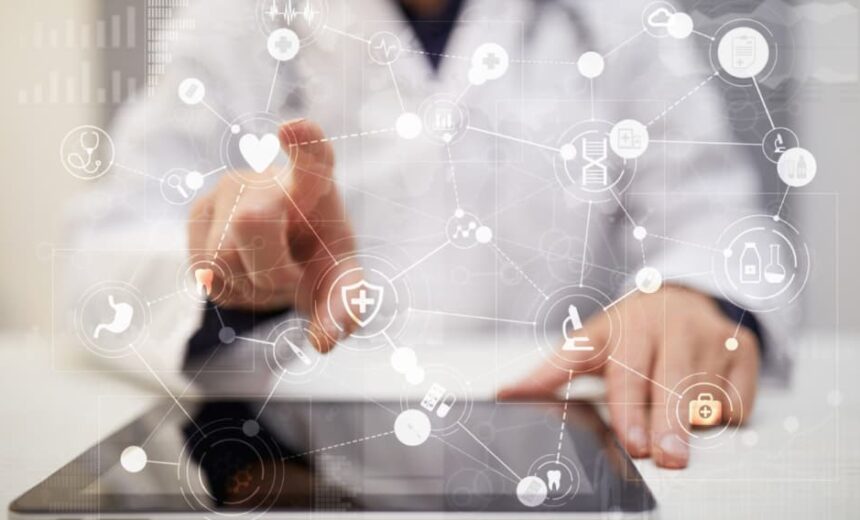Healthcare Software Development Trends

As technology rapidly advances, the healthcare industry is experiencing significant transformations. This article examines the latest healthcare software development trends that are set to improve patient care and optimize operational efficiencies in 2024 and beyond. These trends are not only reshaping the way healthcare providers operate but also how patients receive care, making it more personalized, accessible, and effective.
We have analyzed a list of the best healthcare software developers who are leading the charge in creating innovative solutions tailored to meet the evolving needs of healthcare organizations. This insight into top industry players can help healthcare facilities choose the right partners to implement advanced technological solutions effectively.
Telemedicine: Enhancing Access and Efficiency
Telemedicine continues to transform healthcare by making medical services accessible in remote areas, significantly reducing the need for travel and waiting times. This has proven invaluable for individuals with chronic illnesses or mobility issues. The integration of AI and machine learning has further refined telemedicine platforms, enhancing the accuracy of remote diagnostics and expanding capabilities in predictive analytics. These technologies facilitate more personalized and timely interventions and are crucial in managing outbreaks and health emergencies by enabling rapid response strategies without the constraints of physical proximity.
Data-Driven Healthcare: AI and Machine Learning
AI and machine learning are revolutionizing healthcare by transforming vast amounts of data into actionable insights. These technologies are essential in areas such as personalized medicine, where they help tailor treatment plans to individual genetic profiles and disease markers. In oncology, AI’s ability to analyze complex imaging data can pinpoint cancer markers earlier than ever before, significantly improving patient outcomes. Additionally, machine learning algorithms are being used to streamline operations within healthcare facilities, enhancing resource allocation and patient flow, reducing wait times, and improving patient satisfaction.
The Rise of IoT in Medical Applications
The Internet of Things (IoT) is making a substantial impact on healthcare by enabling a network of connected devices that communicate smoothly. This connectivity facilitates the real-time monitoring of patient health metrics, which can be life-saving for conditions that require constant surveillance, such as cardiovascular diseases. IoT devices also streamline operations by monitoring healthcare facility environments and managing supplies. For instance, sensors can track medication stocks and automate reordering processes, ensuring that essential drugs are always available.
Mobile Health Applications: Bridging Gaps
Mobile health applications are central to modern healthcare strategies, offering tools that range from simple appointment scheduling to complex health monitoring. These apps enhance patient engagement by providing platforms for health education, self-monitoring, and direct communication with healthcare providers. They are particularly effective in managing chronic diseases, allowing patients to track symptoms, medication, and physical activity. Developers are also focusing on improving user interfaces and ensuring these apps are accessible to a broader demographic, including older adults and non-native technology users.
Cloud Solutions in Healthcare: Scalability and Security
Cloud computing in healthcare offers unparalleled scalability and flexibility, allowing healthcare providers to store vast amounts of data securely and access it instantaneously. This is critical for large-scale data analysis, such as genomic sequencing, which requires immense computational resources. Cloud solutions also enhance collaboration among healthcare professionals by providing them with the ability to access and share patient information securely and in real time.
This is vital for complex cases where multidisciplinary teams are involved. Ongoing advancements in encryption and data protection technologies are ensuring that these systems meet stringent regulatory requirements and protect patient privacy.
Enhancing Patient-Centric Care Through Blockchain Technology
Blockchain technology is set to redefine healthcare by ensuring data integrity, security, and transparency. Here are key ways in which blockchain is poised to enhance patient care:
- Immutable Patient Records: Blockchain can provide a secure and unalterable record of patient health data, ensuring accuracy and reducing the risk of medical errors;
- Enhanced Privacy Protection: By decentralizing the storage of health records, blockchain minimizes the risk of data breaches, protecting patient confidentiality;
- Streamlined Transactions: Blockchain technology can facilitate faster and more reliable transactions within healthcare systems, such as billing and claims processing, reducing administrative overhead;
- Interoperability Between Systems: By providing a standardized, secure platform, blockchain fosters better data sharing across healthcare providers, enhancing coordinated care and treatment outcomes.
Advancing Care with Predictive Analytics
The utilization of predictive analytics in healthcare is transforming care delivery by anticipating health trends and patient needs. Here’s how predictive analytics are being applied:
- Risk Identification: Algorithms analyze historical and real-time data to identify patients at high risk of diseases or readmission, allowing for preemptive care;
- Resource Allocation: Predictive tools help hospitals and clinics efficiently allocate resources like staff and equipment based on anticipated patient inflows;
- Treatment Personalization: Data insights enable healthcare providers to tailor treatments to individual patients, improving the efficacy and response rate of medical interventions;
- Outcome Forecasting: By analyzing patterns in data, predictive analytics can forecast patient outcomes, helping healthcare professionals make informed decisions about care paths.
These additions aim to provide further depth to the discussion on healthcare software development trends, highlighting innovative uses of technology that are poised to transform the industry.
Conclusion
The evolution of healthcare technology is a continuous journey toward more integrated, efficient, and patient-centered care. By integrating advanced technologies like AI, IoT, and cloud computing, healthcare is becoming not only more responsive but also more preemptive in its care strategies. These developments are not just enhancing the efficiency of medical practices, but are also significantly improving patient outcomes and quality of life.
As healthcare technology advances, it promises a future where treatments are increasingly personalized, preventive, and precise. This transformation is driven by a deeper understanding of diseases and a more robust integration of technology in everyday health management. Svitla Systems continues to be at the forefront of this evolution, developing innovative solutions that meet the needs of modern healthcare and pave the way for future advancements. These technological strides are essential stepping stones toward a healthier, more informed society.








